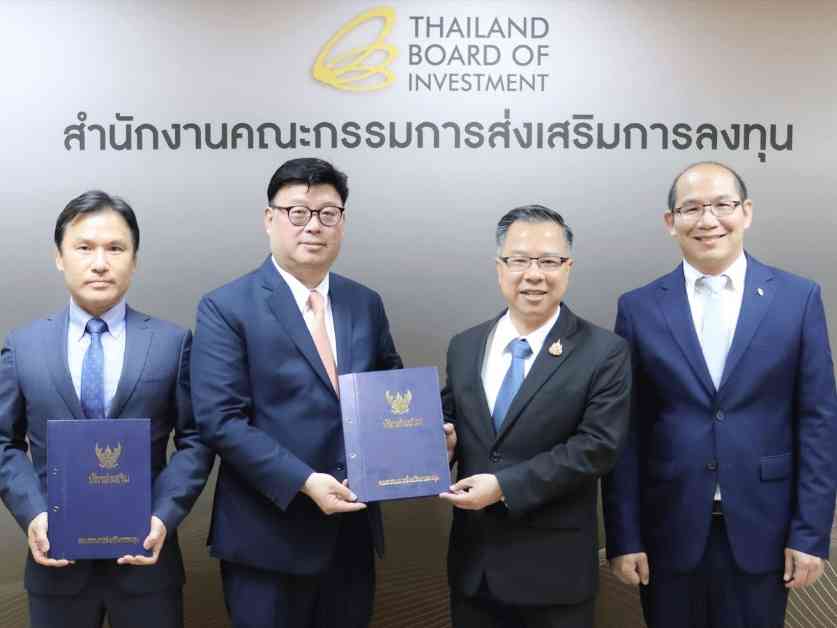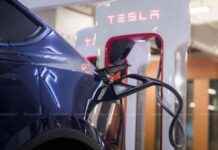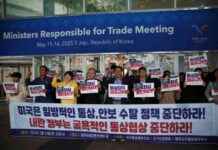BOI Grants Promotion Cards to Hyundai for Electric Vehicle and Battery Production – Over 1 Billion Baht Investment
The Board of Investment (BOI) has recently awarded promotion cards to Hyundai Mobis (Thailand) Co., Ltd. for the production of electric vehicles (EVs) and batteries with an investment of over 1 billion Baht. This strategic move is expected to kickstart production in the early months of 2026.
Mr. Narit Therdsteerasukdi, Secretary-General of the BOI, presented the promotion cards to Mr. Jae Kyu Jang, CEO (2nd from left), and Mr. Jun Ho Lee, CFO (1st from left), of Hyundai Mobis (Thailand) Manufacturing. Also present was Mr. Vallabh Chalermwongsawat, Managing Director of Hyundai Mobis (Thailand) Co., Ltd. This investment is a significant milestone for Hyundai Mobis, known as the top car manufacturer in South Korea, as they venture into the production of EVs and batteries in Thailand.
Investing in the establishment of EV manufacturing facilities in Thailand reflects Hyundai’s confidence in the country’s potential to become a hub for electric vehicle production. It also aligns with the Thai government’s policies to support the electric vehicle industry. The collaboration between Hyundai and local companies spans from car manufacturing to battery production, enhancing the country’s automotive ecosystem and infrastructure, including the development of charging stations.
Hyundai’s Commitment to Sustainable Mobility
Hyundai’s decision to invest in EV production in Thailand underscores the company’s commitment to sustainable mobility and reducing carbon emissions. By shifting towards electric vehicles, Hyundai aims to contribute to a cleaner environment and combat climate change. The promotion cards granted by the BOI will facilitate Hyundai’s efforts to establish a strong foothold in the EV market in Thailand and Southeast Asia.
Hyundai Mobis (Thailand) Manufacturing’s entry into the EV sector is a strategic move to capitalize on the growing demand for electric vehicles in the region. With advancements in battery technology and increased consumer awareness about the environmental impact of traditional vehicles, the market for EVs is expanding rapidly. Hyundai’s investment in EV production signals a shift towards sustainable transportation solutions and underscores the company’s commitment to innovation and environmental stewardship.
Impact on Thailand’s Automotive Industry
The establishment of Hyundai’s EV manufacturing facilities in Thailand is poised to have a transformative impact on the country’s automotive industry. As a leading player in the global automotive market, Hyundai’s entry into the EV sector will not only boost Thailand’s manufacturing capabilities but also elevate the country’s status as a hub for electric vehicle production in the region.
The investment of over 1 billion Baht in EV and battery production signifies a significant milestone for Thailand’s automotive sector. It highlights the country’s potential to attract foreign investment and foster collaboration between international companies and local partners. By promoting the growth of the EV industry, Thailand is positioning itself as a key player in the transition towards sustainable transportation solutions.
Collaboration for a Greener Future
The collaboration between Hyundai and local companies in Thailand underscores the importance of partnership in driving sustainability and innovation in the automotive industry. By working together to develop EVs and batteries, Hyundai and its Thai partners are paving the way for a greener future and a more sustainable transportation ecosystem.
The shared goal of reducing carbon emissions and promoting sustainable mobility is at the core of Hyundai’s partnership with local companies in Thailand. By leveraging each other’s strengths and expertise, Hyundai and its partners are poised to make significant strides in the development of electric vehicles and charging infrastructure. This collaboration sets a precedent for future partnerships in the automotive industry that prioritize environmental sustainability and innovation.
In conclusion, Hyundai’s investment in EV and battery production in Thailand marks a significant milestone for the country’s automotive industry and underscores the potential for growth in the electric vehicle sector. By partnering with local companies and leveraging the country’s manufacturing capabilities, Hyundai is poised to drive innovation and sustainability in the automotive industry. This strategic move not only positions Thailand as a hub for electric vehicle production but also reinforces Hyundai’s commitment to sustainable mobility and environmental stewardship.




















